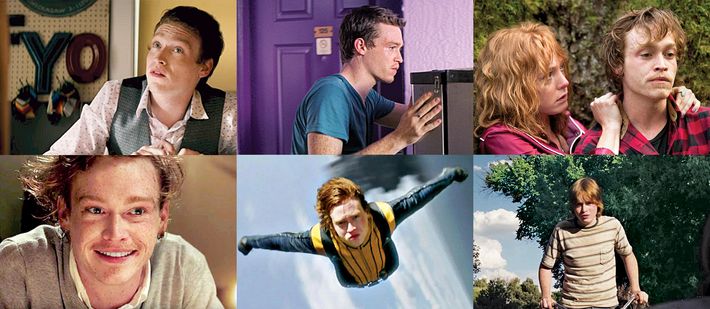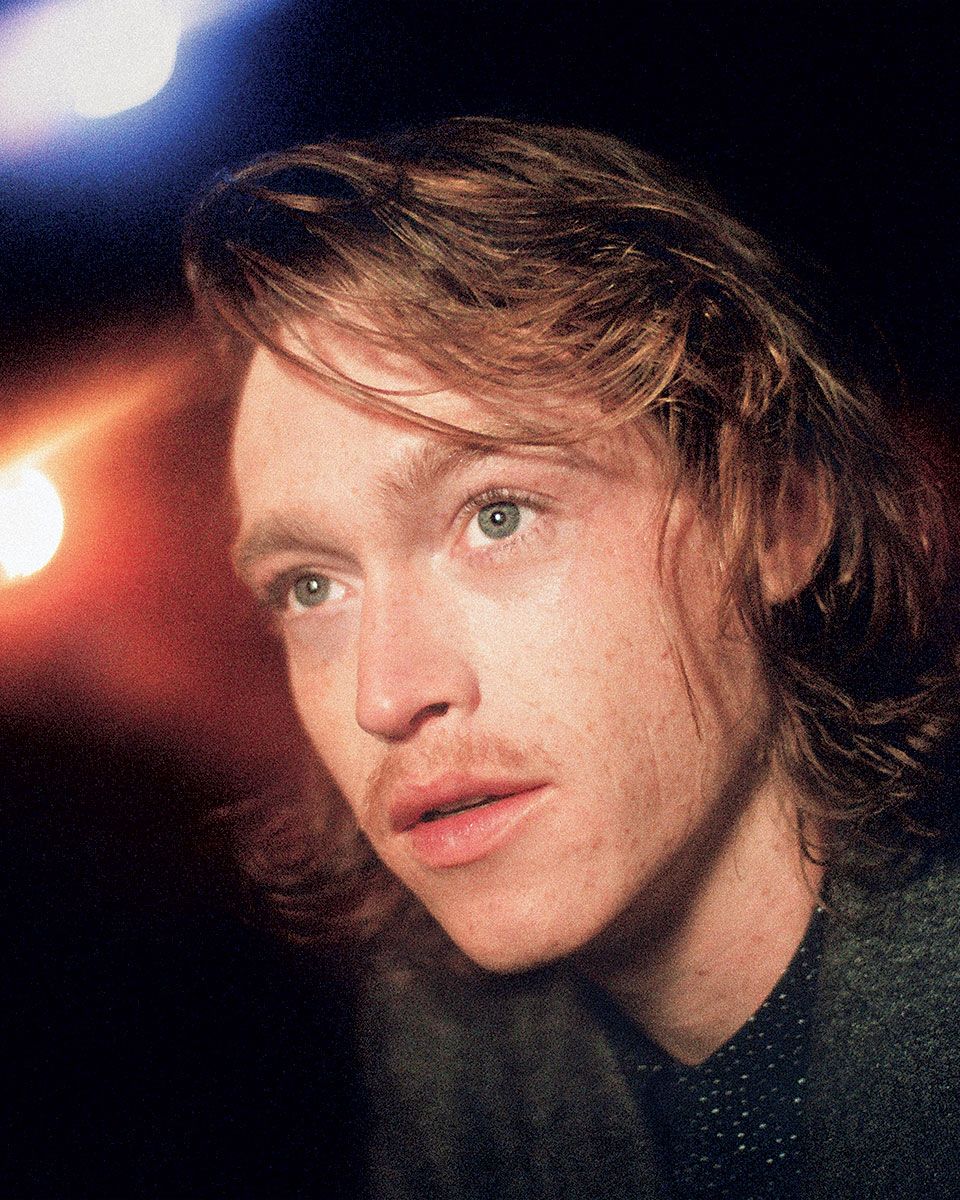Caleb Landry Jones yells “Strawberries!” at the ghosts. There are two of them, and the male ghost is rubbing his big, bulbous nose into his partner’s nether regions, bringing her to loudly ecstatic orgasm. She screams over and over, her happy shouts filling the small cabaret space, but Jones screams even louder. “Strawberries!” he says again. “Strawberries!”
Jones and I have made our way to this cabaret show after three drinks at the next-door Hollywood dive bar the Three Clubs. Every time Jones shouts about strawberries, the puppeteers manning those ghosts squint into the audience to look for the source of the voice. It’s too dark for them to see the 27-year-old redhead in a hoodie sitting next to me, and even if the performers do spot Jones, they might not recognize him as the common-thread character actor in several of the year’s most acclaimed Oscar contenders, such as Get Out and The Florida Project. Still, once the puppeteers finally acknowledge his improv prompt — “Oh,” yelps one ghost, “we got a suggestion from the audience!” — it earns the show’s biggest laugh.
Jones has a knack for that sort of thing: With his wiggly, insistent energy, he can single-handedly ramp up a scene from passable to memorable. As he unwinds with me over gin-and-tonics and a semi-hidden spliff, he acknowledges his recent run of big-screen good luck. “It’s the best working year I’ve probably ever had,” he says. It helps that Jones suits both sides of our current moment: He has the pale skin and southern verve necessary to play a Trump-era villain, but he’s sensitive enough to toggle easily from the bully to his victim. He’s also appealing to auteurs, since Jones is the rare young American actor who eschews social media — his cell phone still has a hinge — in order to throw himself wholly into his work.
Among his besotted directors is Jordan Peele, who had originally envisioned a more conventionally preppy character when he’d written the role of Jeremy, Allison Williams’s sinister brother, in his comedy-horror hit Get Out. “Touches of the original idea are in there, just filtered through the entity that is Caleb Landry Jones,” says Peele, who landed on Jones after watching him in the 2012 sci-fi parable Antiviral. Pitted opposite the film’s hero, Chris (Daniel Kaluuya), in a dinner-table conversation from hell, Jeremy looks like a frat brother gone to seed, his barely cloaked racist insinuations meant to provoke not just Chris but the audience, too. “He has an unpredictable wild-card energy where you feel like he’s a little bit Method,” says Peele. “He really meshes with his character and tries to understand and live in that character, which is a little scary, to be honest.”
“There was something a bit wild and dangerous about him,” says writer-director Martin McDonagh, who cast Jones in the dark comedy Three Billboards Outside Ebbing, Missouri as a good-natured adman who aids Frances McDormand in her quest to find justice for her slain daughter. “Caleb can oftentimes play the crazed weirdo in movies, so in Three Billboards, we tried to harness the sweeter, more intellectual side of him.” While that element comes through, it’s inflected by Jones’s always-unexpected line readings. As Peele puts it to me, “He sort of places himself in the off-balance of the moment.”
Is Jones typecast as eccentrics, or does he wrest his roles in that direction through the sheer force of his personality? When Sean Baker brought Jones in for a day to play Willem Dafoe’s son in The Florida Project, he had to contend with more than just Jones’s uncanny resemblance to Dafoe. “I hope I’m not speaking out of turn, but I felt like he wanted to make him crazy,” says Baker of Jones’s approach to the character. Told that the role should be played free of eccentricities, Jones capitulated, though he still sought to immerse himself in the threadbare world of The Florida Project’s destitute characters. “We put him up at a very nice hotel,” says Baker. “It was only one or two nights, so we could put him up in the Waldorf Astoria in Orlando … and he was like, ‘Get me out of here.’ ”
Jones breezily backs that story up: “I spent 30 fucking dollars on a drink there, Kyle.”

Perhaps Jones was always meant to be an Oscar good-luck charm: After all, he made his film debut in a Best Picture winner. At age 16, he played one of the teenage boys who stumble upon an injured Javier Bardem at the end of No Country for Old Men, which takes place in Texas, the state where Jones grew up. It was the first time he had acted in front of a camera, and he had the good fortune of doing it for Joel and Ethan Coen. “They were very nice,” Jones recalls, mimicking their directions: “ ‘Caleb, not so theatrical.’ ‘Caleb, just say the lines.’ ”
He had already been drawn to acting in high school in Texas, seeing it as a way to cope with a life where he felt he’d grown up too fast. “The things that get taken away, you can only bring them back through pretend,” Jones says. Not long after No Country came around, he won a role in the horror film The Last Exorcism and decided to make his way to Los Angeles. Six months later, he was cast as the mutant Banshee in X-Men: First Class, appearing alongside Jennifer Lawrence and Michael Fassbender.
It is still the biggest movie on his résumé, “so big that they could build the set, destroy the set, build it again, and then destroy it again,” Jones says. While playing Banshee, who can fly using the power of his sonic scream, Jones found himself butting up against the constraints of a big-budget blockbuster: “I promised myself, ‘Okay, now that you’ve got the job, do what you think you’re supposed to do all the time. If you think you’re supposed to look up, look up! You’re supposed to yell? Yell! Don’t let anyone make you feel like you can’t do nothin’!’ ” Several sequels have been added to the franchise, but Banshee was killed offscreen between the first and second. “I did what I wanted to,” he says. “I don’t know if that’s good or bad, but at the end of the day, that’s what I could tell myself.”
When Jones first got to Hollywood, he worried that the allure of fame and ambition might contaminate his process; he’s perfectly happy, then, to still live in the same modest studio apartment. “Most people just wanna drive a Ferrari,” he says, shrugging. Jones turns toward the bar’s TV, which is playing the early Jake Gyllenhaal film Donnie Darko. “Let this guy bust his nuts trying to get an Oscar. Go ahead, buddy!” Jones says with a grin. “This is the best work he’ll ever do.”
That devotion to his own drumbeat has given Jones cachet with filmmakers trying to make idiosyncratic work within an increasingly corporate system. When Peele set Jones loose in Get Out’s dinner-table scene, “it felt the most like I would imagine the fun of shooting a film in the ’70s was,” says Peele, “when you have an actor who is so in character that the scene comes out many different ways.” Some of the time, Jones doesn’t even recall what he’s done during a take. “You know when you push so hard and you pop blood vessels and go unconscious a little bit? Sometimes it’s like that, when you wake up and you don’t know where you are.”
The most immersed Jones has been in a recent role was during the revival of Twin Peaks, when he played a shivering lowlife who comes to an ambiguous bad end. “It meant a lot of strange walks and anxiety and dealing with emotions I was already going through,” says Jones. “Maybe somehow, based on the audition, they knew that I was dealing with them.”
What kinds of emotions? “Suicide. Self-destruction … I think there’s an aspect of that I can use, and then in other ways, it’s hurt me or made it harder. But I’m always trying to build a larger hole to get out of, and I don’t know why.”
In life or in the roles?
“In life,” he says, “and therefore, in the roles.”
When it comes time to settle the bar tab around midnight, I find that Jones has already persuaded the bartender to replace my credit card with his own. Is this his southern hospitality coming to the fore? “Nah, that’s just, I was never able to do that until three years ago.”
Jones invites me back to his apartment to watch movies and check out some art he has been making. Having not acted in months, he’s instead been prolific with a paintbrush. “It took great testicular pain to convince me to do it,” he says. What happened? “Well,” he sighs, “I was masturbating.” He overcommitted to the act, as he has a general tendency to do, and had to see a doctor. “Less than a week and it still hurt, so I went back to urgent care,” he says. “And then, like an idiot, I had a lot of sex. I don’t get a lot of sex, but I had a lot of sex. And then it kept hurting for another 15 or 20 days!”
He frets as we near his apartment — “I’ve got one chair for you to sit down on” — and wonders what I might write about him: “ ‘Have you seen his apartment? It looked like a meth addict’s!’ ” The small place is filled with piles of DVDs and paintings, his bed a simple mattress on the floor with a guitar resting on it. He rifles through the paintings, trying to find one he feels proud enough of to show me. “Bad one,” he mutters, peering at the next. “No good.”
“He’s a little bit hard on himself, to be honest,” Peele says. “Between takes, he’s always trying to improve himself and get better, so part of my role was to just let him know how golden the takes were that I was getting.”
Jones finally hands one of the paintings to me, a colorful Cubist rendering of naked bodies. I hold it upside down, which delights him. “Now, what do you think of a museum where every five seconds, they do this?” he says, flipping the painting. “That’d be an all right museum, wouldn’t it?”
And as we drink a little bit more and talk about the brushstrokes, I remember something Jones said earlier when I asked him about playing all those supporting roles. “They’re asking for a little blue in between the green and the yellow,” he said. “And I hope I get that little blue, and show them a little something there that wasn’t what they thought.”
*This article appears in the October 30, 2017, issue of New York Magazine.


